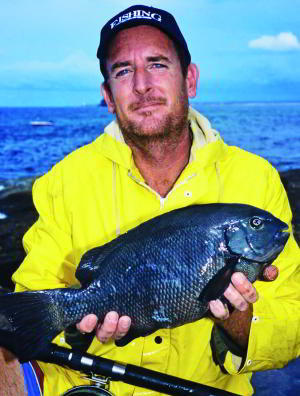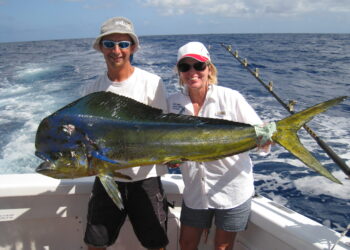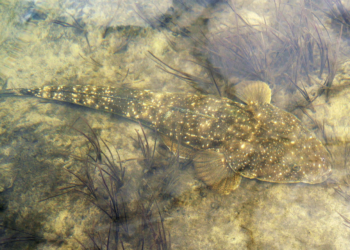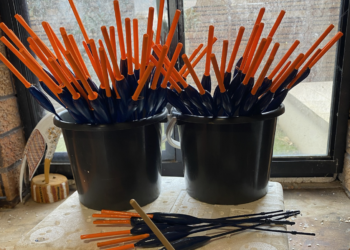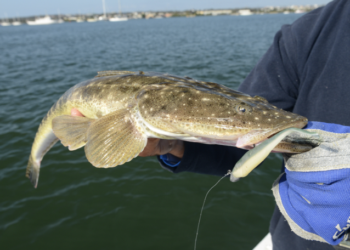THERE are few more challenging sportfish than the eastern rock blackfish, more commonly known as the black drummer or pig.
Scientifically known as Girella elevata, this powerfully built inshore sportfish inhabits coastal wash zones from Noosa in Queensland down to Wilsons Promontory in Victoria.
Closely related to the luderick and the rarely caught bluefish, the drummer is something of a throwback to a bygone age.
Unlike other common species such as bream and flathead which are primarily targeted with ultra light or finesse tackle, standard drummer tackle and techniques haven’t really changed that much.
The fact is drummer fight bloody hard, whatever tackle you use. In my opinion, catching a 3kg plus drummer is just as meritorious as landing a metre plus barra.
Drummer are readily accessible to anglers along the NSW coastline. As well as being top sportfish, they’re excellent table fare as well.
Although available year round, the cooler months (ie, right about now as you read this) are prime time for chasing drummer off coastal rock ledges.
The following is a rundown of the techniques required to successfully target these tremendous rock brawlers.
Tackle & Techniques
Drummer live their lives in the white-water maelstrom created by ocean swells pounding into the washes, gutters and bommies surrounding our coastal headlands.
Any fish that can survive living in a veritable washing machine is tough – and they don’t come any tougher than Girella elevata.
Any gutter or hole on a headland that has continual white-water in it has the potential to produce drummer. The trick is to attract any drummer in the area via the use of a bread-based berley stream.
Optimum conditions to fish for drummer are generally a run up tide during a low light period such as dawn or dusk.
Rigs for drummer fishing are surprisingly simple. Most anglers use a tough monofilament line such as Rovex 10X or Schneider in the 10 to 12kg range and fish either a running ball sinker rig or suspend their bait below a bobby cork.
Strong hook patterns are required for this style of fishing. The Mustad Big Gun in size 1 has become popular in recent years and the classic Mustad 542 pattern is still available in size 1/0 for those chasing big drummer.
The idea is to have your cunje, peeled prawn or bread bait washing around in the gutter in the most realistic manner possible. Fish too deep or with too much weight and you’ll be continually snagging up.
Preferred outfits include powerful rock and beach rods such as the FSU4120 or MT8144.
Competition anglers often use bent tip rods when drummer fishing to alleviate the problem of line wrapping around the rod tip when fishing at night.
Alvey sidecast reels in the 6 to 6.5 inch range provide direct winching power and cast lightly weighted baits well.
Good quality threadline reels with strong gearing can also be used for this type of fishing. Many anglers on the NSW Mid-North Coast use overhead reels for drummer fishing with good results.
Potholing is a specialist technique employed by competition anglers to chase drummer at night by berleying them up into shallow holes or gutters that can be fished safely.
It’s incredible how small and shallow a location that drummer can be enticed into in the right conditions. I’ve caught drummer in a number of coastal swimming baths or rock pools at night while employing this technique.
This style of fishing is for experienced rock fishers only and I’d recommend anyone wanting to learn about it should join a club where you could be taught and chaperoned by experts.
Baits & Berley
Drummer are omnivores, which means they can be taken on a range of baits.
My personal favourite is cunjevoi, which can be harvested from coastal rock ledges – just remember to adhere to the bag limit, which in NSW is 20 in total.
Good quality peeled prawns such as those from the Hawkesbury River are also an excellent drummer bait, particularly if potholing at night.
Drummer can also be taken on marine weed baits such as sea lettuce or green weed.
Luderick anglers fishing weed baits suspended below a float or bobby cork regularly hook drummer, although landing them on lightweight luderick tackle can be challenging to say the least.
To be a consistently successful drummer angler requires the use of bread berley.
Saturate your bread in a bucket of water until it breaks down, so the majority of it sinks when thrown into your intended fishing hole or gutter.
Too much bread floating on the surface tends to attract the seagulls. Fresh bread which can be moulded onto a hook also makes an excellent drummer bait which, unlike cunje or prawns, doesn’t attract undesirable by-catch such as wirrah and kelpfish.
There is definitely a skill to the correct application of bread berley when drummer fishing.
My good mate Bob Williams from West Gosford Bait & Tackle on the NSW Central Coast is a champion rock and beach angler who taught me to initially use a lot of bread berley to attract the drummer to the location you intend to fish. Once you have them on the chew, you ease back to small regular handfuls to keep them in the vicinity without overfeeding them.
Abalone gut is currently banned from use as bait or berley in NSW to reduce the risk of transfer of the abalone viral ganglioneuritis, which has impacted on ab stocks in Victoria and Tasmania. It’s a shame as drummer really go for this pongiest of baits.
Soft Plastics & Fly
There is a lot of potential for the use of scented soft plastic baits fished in a berley trail for drummer.
I know Fisho editor Jim Harnwell enjoys great success using three-inch Gulp Jigging Grubs in the pumpkinseed colour on drummer when fishing the washes around Jervis Bay in his boat.
Given the drummer’s penchant for prawn baits, I reckon a two-inch Gulp Shrimp in pepper prawn colour wouldn’t last long in a berley trail.
Abrasion resistant fluorocarbon leader and a lightly weighed jig head with a strong hook would maximise the chances of success when soft plasticking for drummer.
Fly-fishing for drummer is a tremendous challenge. To have any hope of landing them on the long wand requires a commitment to fishing the gear to breaking point.
For that reason we generally use cheaper fly rods in the 10 to 12 weight range when chasing drummer. Weighted bread flies fished on sink tip lines work well in conjunction with a bread berley trail.
Some locations are more suitable than others for fly-fishing. It’s important to fish locations where you can maintain contact with the fly as bites are often nothing more than timid pecks, which turn into an uncontrollable rampaging express train when you hook up.
Good luck and pull hard if you want a drummer on fly.
Iso Fishing
Rock specialist John Newbery documented the successful use of Japanese and Korean Iso fishing techniques for chasing drummer in the January 2013 edition of Fisho.
This finesse style of bobby cork fishing with long lightweight rods and lever braked threadline reels is ideally suited to chasing drummer in hard-fished areas.
It also looks like a lot of fun with the added bonus of plenty of by-catch in the form of bream, trevally and luderick. For more info on Iso fishing gear and techniques go to www.isofishinglifestyle.com.au.
There’s nothing that gets the adrenalin pumping like hooking a really big drummer. To land them requires luck and the ability to fish your gear hard.
Fight times are short and intense, much like smaller versions of the famed PNG black and spot tail bass I fished for back in the 1990s.
Best of all, they’re not targeted by commercial fishers so there are still plenty out there for us to catch.
Give them a go – I’m sure you’ll be surprised by how hard drummer pull and how good they are on the plate.
This story was first published in the Fishing World October 2013 issue.





